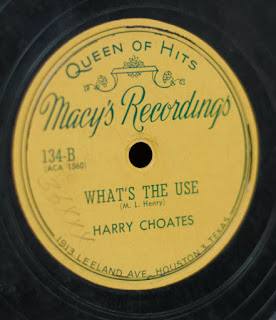It was April of that year when he got word that Macy wanted him to record for her. He was already contracted to Bill Quinn, but that never was a consideration for Cajun fiddler Harry Choates. He jumped in his vehicle and headed to the ACA studio to meet other musicians lined up such as Earl Rebert on steel guitar, possibly Sue Romero on bass, and possibly Louis Oltremari on piano accordion. There, he recorded the poignant "What's The Use" (#134), a fatalistic predetermination that he was killing himself with every drink he took.1
Toi t'après m'a laissé,Avec une autre tu m'a quitté,Oh, moi, j'connais mérite pas ça, haha.Oh, quoi ta fais, mais, ça ta faisMoi, j'connais, mais, chère 'tite fille,Moi, j'espoire, mais, quelle espoire, mais, chère mignonne.Il y a pas longtemps, tu voir tu regret,Chère 'tite fille, pour quoi ta fais,Oh, moi, j'connais t'as fait de la peine.
 |
| Liberty Vindicator Oct 19, 1950 |
You, you are leaving me,With another, you left me,Oh, I know I don't deserve that, haha.Oh, what you've done, well, that you've done,I know, well, dear little girl,I hope, well, what hope is there, well, dear little cutie,There it won't be long, you'll see you'll regret,Dear little girl, for what you've done,Oh, I know you hurt me.
Undecided on the song title, ACA ledger notes show the alternate French title "C'est pas la peine", misspelled as "Sapala Pan".3 Poncio and Macy's most notable recordings came that same year with her experimental zydeco recording of Clarence Garlow's "Bon Ton Roula" and Lester Williams's "Wintertime Blues". Macy took advantage of the industry's "double payola" where during this period, deejays were paid to play a Macy's record and then paid extra not to plug the competition. Once Steve left to create United Recording Distributing Co. a year later and her husband's health began to fail, Macy closed her business.
- Poor Hobo: The Tragic Life of Harry Choates, a Cajun Legend by Tim Knight
- Roadkill on the Three-chord Highway: Art and Trash in American Popular Music By Colin Escott
- Audio Company of America, Master Book, 1950-1951
Release Info:
ACA-1556 Louisiana Boogie | Macy's 134-A
ACA-1560 What's The Use | Macy's 134-B
Find:
Harry Choates: Five-Time Loser 1940-1951 (Krazy Kat, 1990)
Cajun Fiddle King (AIM, 1999)
Harry Choates: Five-Time Loser 1940-1951 (Krazy Kat, 1990)
Cajun Fiddle King (AIM, 1999)

No comments:
Post a Comment
Got info? Pics? Feel free to submit.